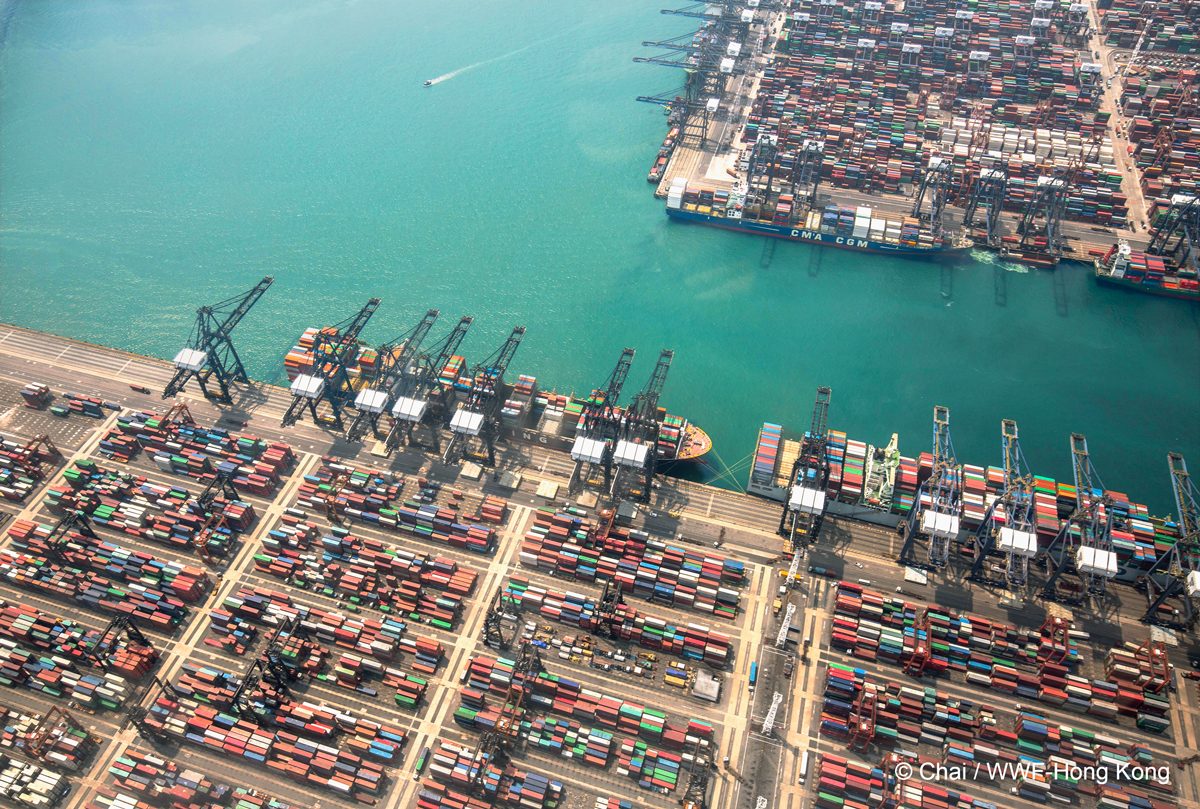The WWF is run at a local level by the following offices...
- WWF Global
- Adria
- Argentina
- Armenia
- AsiaPacific
- Australia
- Austria
- Azerbaijan
- Belgium
- Bhutan
- Bolivia
- Borneo
- Brazil
- Bulgaria
- Cambodia
- Cameroon
- Canada
- Caucasus
- Central African Republic
- Central America
- Chile
- China
- Colombia
- Croatia
- Democratic Republic of the Congo
- Denmark
- Ecuador
- European Policy Office
- Finland
Needle in a Haystack: Deploying Innovations in Identifying Risks of Wildlife Trafficking in the Complex World of Maritime Supply Chain
Swire Shipping and WWF Partners to Create Solutions to Benefit the Maritime Sector
June 2023
 |
Only about two percent of containers shipped around the world are physically examined by customs. This is the main reason why government agencies and private companies rely on technology solutions to strengthen port screening and control.
However, lack of data sharing among shippers and various port screening applications operating as siloes continue to weaken shipping control at international ports. It is gaps like these, in particular those related to screen booking details and shipping documentation, that traffickers and organized crime groups exploit to move illegal goods across the globe.
The problem of mis-declared and undeclared goods (non-compliant, military, illicit, dangerous goods, etc) has made maritime trade highly vulnerable to the trafficking of illegal goods including wildlife. In 2022, maritime seizures accounted for over 50% of the cumulative weight of seized elephant ivory, rhino horn, and pangolin scales across all transportation types. There was also a 37% increase in the total weight of products seized in the maritime sector between 2021 and 2022.
The challenge posed by international wildlife trafficking (IWT) to the maritime supply chain can be potentially addressed by a global, multi-stakeholder initiative to develop an industry-wide cargo screening solution for wildlife shipments. SSL and WWF, working with other NGO and private sector partners, will pool their resources and share expertise to bolster the IWT component in the screening technologies in the shipping and maritime supply chain sector.
According to Ms. Susana Germino, General Manager for Sustainability and Decarbonisation, SSL welcomes the opportunity to take part in the “development of the Proof of Concept (POC) technology solution to screen bookings and shipping documentation for mis-declared or undeclared wildlife products.”
“We understand that the POC is the first big, strategic step towards the creation of a library of key words, including CITES vocabulary that will lead to rules-based approach on screening,” she adds.
With financial support from Swire Shipping and WWF’s Innovation Fund, WWF-Hong Kong will develop the POC for the technology. In collaboration with United for Wildlife, TRAFFIC and other partners, IWT rules and vocabulary will be adopted, tested, and iterated with current and emerging partners from the maritime and technology sectors.
GM Germino affirms that, “At Swire Shipping, we are committed to safeguarding our ecosystems and conserving species diversity. Shipping plays a vital role in preventing the transportation of illegal wildlife products, and we are proud to be partnering with the WWF on a technological solution for the identification of suspicious cargos. By combining our expertise in maritime logistics with the WWF’s wildlife and conservation knowledge, we strive to make a difference in the fight against wildlife trafficking and create a more sustainable future for our planet."
Exis Technologies, the maker of Hazcheck Systems, an IT compliance system that screens dangerous goods for shipment, will provide the adaptive algorithms for the solution. As part of the NCB Group, a not-for-profit organization with a mission of safety of life and cargo at sea, Exis Technologies will provide technical expertise with the goal of creating a database that is fully interoperable and can be seamlessly integrated in the screening solutions carriers are currently using.
While the cargo-screening tool is technology-driven, the project aims for a holistic approach in the development and implementation of the new technology. The tool, including its database, aims to be part of an ecosystem of solutions available for the container liners.
Ms. Nicole Wong, CEO WWF Hong Kong, lauds the inclusive approach of the project team and sees the participation of industry partners and regulatory bodies as pivotal in securing additional funding from the WWF’s Cross-Practice Innovation Fund to further elevate the project after the completion of the POC. She pointed out that this industry-led project contributes to WWF’s global outcomes for Zero Extinction of species by having direct impact on ivory and Illegal wildlife markets, illegal trade of CITES species, wildlife practice, Oceans, and Markets. WWF Hong Kong is host to a regional initiative called the Asia Pacific Counter-Illegal Wildlife Trade Hub. The Hub incubates, invest and deploys innovations and systemic approaches to counter-IWT in the supply chain, working with financial, e-commerce and transport sectors.
“We have seen that the current system and practice of cargo screening is not enough,” she adds. “The shipping and maritime container industries need a shared technology solution to effectively screen shipments. The innovation we have in mind will have an up-to-date library of keywords and adaptive rules and parameters guided by Artificial Intelligence and machine learning. And because it is going to be shared, it will benefit all carriers equally thereby ensuring at the very least, basic level of compliance and consistency.”
Once implemented and adopted by shipping companies, the cargo-screening tool is expected to have a strong impact on IWT as traffickers are more likely to avoid shipments if there is a reasonable chance their shipment will be inspected. The technology will also pave the way for data-driven, informed decision-making through accumulation of historical data, allowing us to measure the true volume of trafficking in containerized shipments, observe product movements, and understand consumption and demand volume trends.